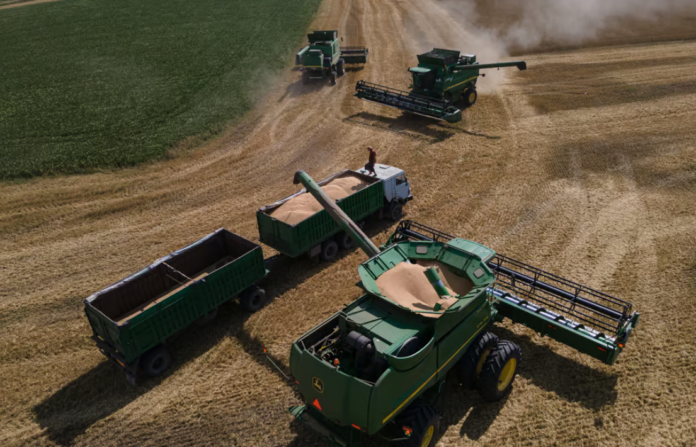Most EU countries are against extending an import ban on Ukrainian grain beyond mid-September, four EU diplomats told Politico, pushing back against calls by five eastern member countries to keep the restrictions in place.
Ukrainian grain products — wheat, maize, rapeseed and sunflower seeds are banned from the markets of Poland, Hungary, Romania, Bulgaria and Slovakia under a deal struck with the European Commission earlier this year to protect their farmers from an influx of cheaper produce from their war-torn neighbor.
The restrictions are due to expire on September 15, but the front-line five have been advocating for their extension until at least the end of the year.
At a meeting with the Commission on Wednesday, EU ambassadors from the remaining 22 member states either openly opposed the idea of extending the restrictions or remained deeply skeptical, a senior EU diplomat said. France and Germany were among the countries most critical of the extension, the diplomat said, according to Politico.
Two diplomats said that while many countries recognized the difficulties faced by the five eastern countries, they have asked the Commission to propose alternative measures.
One EU diplomat from a country skeptical of the extension argued that a decision to extend the import restrictions would be “purely political,” with Poland’s forthcoming general election looming over the discussion. The diplomats were granted anonymity as they are not authorized to speak publicly about the discussions.
Poles go to vote mid-October. With farmers protesting the influx of Ukrainian grain, which they view as a threat to their livelihoods, the lapsing of the deal could have political consequences for the conservative government led by the Law and Justice (PiS) party.
A senior Polish official acknowledged that the election was playing a role.
“The reason for the introduction of restrictive measures on EU level was the fact that the farmers started to block roads and terminals. And we need to avoid the situation that desperate farmers, or radical leaders of farmers unions, are using this situation,” the official said.
“The time of election is the moment where some politicians, some leaders of radical organizations can use the situation, for example, to block roads or to block terminals. So definitely, we have to reduce let’s say the number of factors that would help them.”
Another Polish official, briefed on Wednesday’s discussions, argued that there were “no substantive grounds” to let the measures expire. “When it comes to fact-based factors now there is a greater justification for maintaining the exemption than in April” when the measures were first introduced, the official said.
Ukraine disagrees, and has threatened to take the EU or individual countries to the World Trade Organization should they extend the import ban beyond September 15. Kyiv argues that there is no evidence suggesting price deviations or a significant increase in grain supplies that would justify extending the import restrictions.
The Commission alone will decide whether to let the restrictions expire, but given the evidence, the EU executive would be hard pressed to justify an extension, said the diplomat from one of the skeptical member states.


